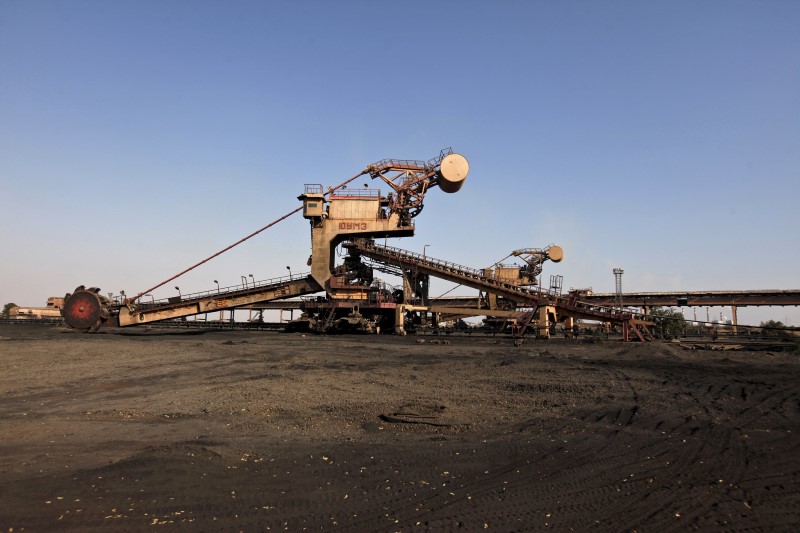By Mehreen Zahra-Malik and Tommy Wilkes
KARACHI (Reuters) - Once the producer of almost half the country's steel needs, state-owned Pakistan Steel Mills' (PSM) cavernous factory buildings on the outskirts of Karachi stand eerily still.
A 4.5 km-long (2.8 mile) conveyor belt that once carried coal from the nearby port is idle and blast furnaces rest silent. Birds build nests in Soviet-era equipment and stray dogs nap outside abandoned plants.
The company is for sale, but the government cannot find a buyer as it struggles to get privatizations back on track after a series of setbacks. A glance at PSM's finances may explain why.
The company has $3.5 billion in debt and accumulated losses, loses $5 million a week and has not produced steel at its 19,000-acre facility since June last year. That was when the national gas company cut power supplies, demanding payment of bills of over $340 million.
Like many Pakistani industrial firms, political meddling and competition from cheaper Chinese imports left PSM vulnerable.
They also undermine Prime Minister Nawaz Sharif's promise to the International Monetary Fund to privatize PSM by March, in return for a $6.7 billion national bailout loan agreed in 2013.
More than 14,000 jobs are at risk, while the Pakistani economy needs industrial growth to provide employment for a growing population.
"Nine billion rupees ($86 million) are immediately needed to see the company through to June," company CEO Zaheer Ahmed Khan told Reuters at its sprawling premises.
"It's really sad, it's a national asset. We are a nuclear power but what does it say that we can't operate a small steel mill?"
PRIVATIZATION PAINS
The government has injected $2 billion into PSM since a failed selloff in 2006, but cannot invest more capital, Privatization Commission Chairman Mohammad Zubair said.
"The best option is to privatize so that private sector buyers inject capital to upgrade the plant and machinery, buy raw material and so on," he said.
PSM is one of several firms Pakistan wants to sell to revive loss-making entities that cost the government $5 billion a year.
But it has struggled to restructure bleeding companies, including PSM and Pakistan International Airlines (PIA), and get them in shape for potential buyers.
This month, Pakistan shelved plans to privatize power supply companies, and officials said Islamabad told the IMF it would not meet deadlines to sell PIA or PSM.
While the loss-making firms are a drain on Pakistan's resources - around an eighth of the government's fiscal revenues last year - few fear Pakistan will slide into economic crisis.
The IMF has continued to release installments of its 2013 bailout package despite missed targets, and Pakistan is exploring other sources of support, like ally China which plans to invest $46 billion in a new economic corridor.
BACK IN THE USSR
Designed and funded by the Soviet Union in the 1970s, PSM was once the pride of the nation, showcasing a rapidly industrializing Pakistan with the means to produce a basic building block for the future.
Across the site, signs implore workers to believe steel will make Pakistan stronger. The firm's motto is "Yes, I can."
The facility has the capacity to expand to produce 3 million tonnes of cold and hot-rolled steel annually, against today's 1.1 million tonnes, CEO Khan said. At 3 million tonnes, PSM would become "very profitable".
But managers failed to upgrade machinery, losses spiraled and production tumbled 92 percent in the past decade as demand for steel tanked during the 2008 recession and customers turned to cheaper Chinese products.
International buyers show little interest. Officials close to the government's privatization agenda said suitors offered barely $100 million for PSM against an expected $900 million.
"You have the land and ... infrastructure but it doesn't have the machinery," said Arif Habib, a businessman whose conglomerate bid for the company a decade ago but would not touch it now.
With no takers, the federal government wants the cash-strapped provincial government in Sindh to take over.
A group of Sindh officials visited the site this year, the CEO said. They left with financial feasibility documents but never called back.
Zubair, the privatization chairman, said if the Sindh government refused to take over, he would re-start the privatization process.
UNPAID, STILL WORKING
Privatization would be contentious: this month, protests against the sale of PIA turned violent.
PSM employees, half of whom live on the site in a residential complex complete with hospital and cricket stadium, haven't been paid for five months.
But pride and few alternatives mean most spend their days at the plant, repairing and chatting.
At sunset, the remaining 7,000 workers pile into buses for homes in Karachi, a teeming port city over an hour away.
Mohammad Taqi, who has worked at the plant for 38 years, still turns up every day.

"I've spent so many years here that I just pray that it will start working again," Taqi said, next to silent, towering blast furnaces. "This place used to be alive. I just want things to be the same again."